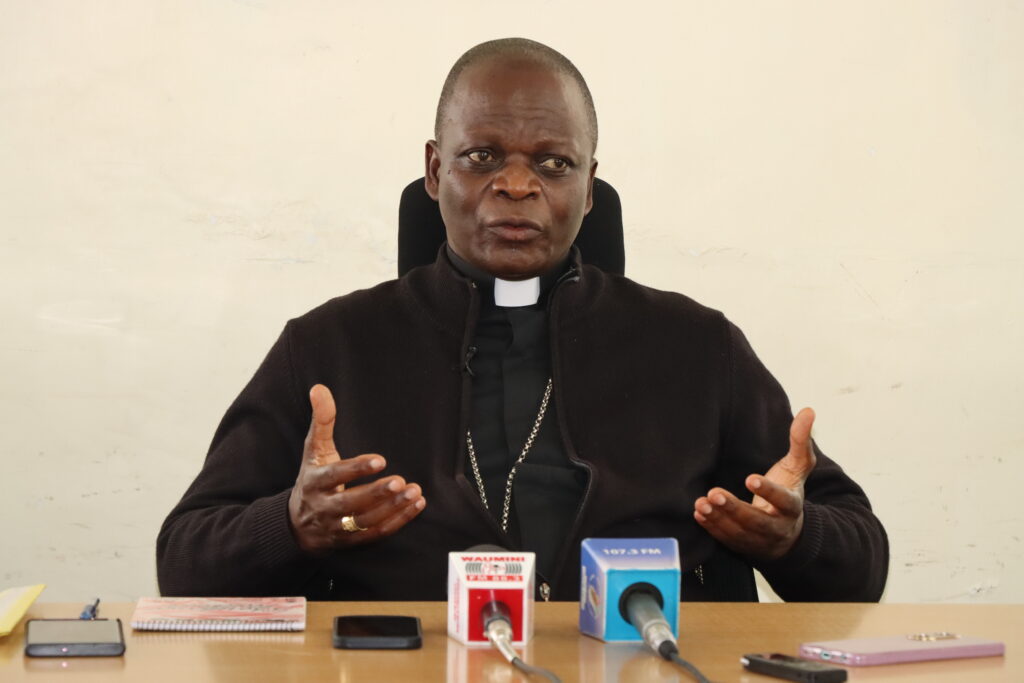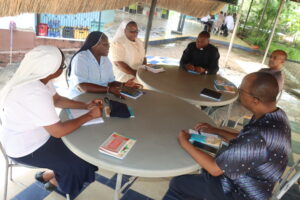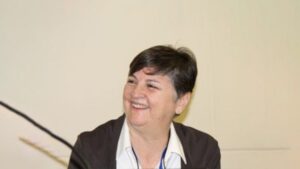KENYA: Bishops in Kenya Set for Ad Limina Visit in Rome: An Explainer of What it Means

Archbishop Maurice Muhatia Makumba
Sr. Jecinter Antoinette Okoth, FSSA
Over the years Catholic Bishops from across the world have been paying visits to the Holy Father at different intervals to discuss their ecclesial mission in what the Church terms as an “Ad Limina” visit. This year in the last week of August, it will be the turn of members of the Kenya Conference of Catholic Bishops (KCCB) to visit the Pope. Prior to this significant trip, the KCCB’s chairman Most. Rev. Maurice Muhatia Makumba of Kisumu Archdiocese had an interview with Catholic communicators on Wednesday, August 14, to expound on the meaning of this encounter with the Holy See.
What is the meaning of Ad Limina visit?
Archbishop Muhatia: An Ad Limina is a short form of ‘Ad Limina Apostolorum’ which is translated to mean the doorsteps of the Apostles or to the thresholds of the Apostles. So, bishops as successors of the Apostles, imply that they visit the doorsteps of the two Apostles St. Peter and St. Paul. So, the Ad Limina visit has a very important spiritual significance. The Bishops go to Rome to express themselves as the successors of the apostles, to express that unity of purpose with these two princesses of the apostles who were martyred in Rome and buried one, in St. Peter’s Basilica and the other in the Basilica of St. Paul outside the walls. They then celebrate Mass at the tomb of the two Apostles.
To express the spiritual significance of this visit further, the Bishops also have a conversation with the Holy Father in person, and through the offices that represent him in Rome. This is to express the unity and communion of the Church. The Holy Father is the principal guardian of the deposit of faith, and the bishops only together with him make the College of Bishops. So, by visiting Rome, the various conferences from across the world at different intervals express this communion with the principal guardian of the deposit of faith.
Through this visit, the bishops feel in union with the Holy Father because of the representation of the Local Church and move to Rome to have an encounter with the Holy Father for the expression of this unity and communion. Apart from meeting the Holy Father in person, the Bishops also meet the various dicasteries because they are still arms of the Holy Father.
At what intervals should the bishops have this Ad Limina visit?
Archbishop Muhatia: This visit is normally supposed to take place every five years that is why it is called a quinquennial visit. But as bishops from Kenya, this time we are going after nine years because of obvious challenges. We have had Covid-19 and this could not allow people to travel for some time. Additionally, it was also because of the health of the Holy Father. So, our visit has been rescheduled and this is why we are having our visit after nine years. It is hoped that after this visit, we shall resume the normal every five-year visit.
Is it mandatory that all bishops be present for the visit to Rome? and in which circumstance can a bishop fail to attend the Ad Limina?
Archbishop Muhatia: The visit is obligatory for bishops in office unless there is a grave reason why one cannot make it to Rome. It is expected that all Bishops in active ministry of a particular conference; the auxiliary bishops and Apostolic administrators in fact all those who have the status of Ordinary such as Military Ordinary are to go to Rome. The only bishops who don’t participate in the Ad Limina visit are the retired Bishops.
The Holy Father may want to know more about the Catholic Church in Kenya what are the statistics of the Catholic Population currently?
Archbishop Muhatia: I think since we were in Rome about nine years ago, there have been major developments in the Catholic Church in Kenya, especially positive ones. There is a clear growth in faith and the population of Catholics can be estimated at 12-15% of the entire population in the country. This is a substantial part of the population. Most importantly, the Church in Kenya is very vibrant, and the role played by the Catholic Church in society is very much felt.
You are going for the Ad Limina visit in the year when the synod is being concluded. Since the faithful participated in sharing their views, what should they expect from your visit as far as communion with the Universal Church is concerned?
Archbishop Muhatia: As I said, we are going to express our union and communion with the Holy Father. The second and last phase of synod on synodality will take place almost a month after our visit. We expect to continue participating as we did last year to have delegates on behalf of KCCB who are the former chairman for KCCB Archbishop Martin Kivuva of Mombasa and the current Vice Chairman Archbishop Anthony Muheria of Nyeri. The people of Kenya have expressed themselves on synodality with the importance of what the Holy Father is talking about; communion, participation, and mission.
From that point, I think this particular solidarity is helping us to move together as a Church to grow to share and evangelize. Of course, not that all the challenges that have been expressed towards this ongoing synod have been sorted out but we are moving in hope under the guidance of the Holy Spirit that after the second phase of this synod, what will come out of it will be beneficial for the growth of the Church and evangelization in the whole world.
When the bishops go for their Ad Limina visit they take a report to the Holy Father, what would be some of the concerns from the Kenyan Church in the report?
Archbishop Muhatia: Ordinarily, each bishop prepares his five-year report which in this case the nine-year report. The content may vary from diocese to diocese because of varied pastoral challenges though some things may be the same. The report generally includes statistics; what has happened between the time when the last report was presented and now, the number of the Christian faithful if there is growth or not. If the number has reduced, this needs an explanation. The report also includes the challenges the Church is presently facing in the country and together we see the solutions that can be given regarding the report.
Actually, the reports are sent ahead of time, more than a month before the travel. That means we had sent our reports, they have been read already and at the time we are going to Rome the engagement will be live.
When Pope Francis visited Kenya in November 2015, he talked extensively about corruption, does the Kenyan Church have a report on the achievements and challenges on the same issue?
Archbishop Muhatia: Yes, the Holy Father talked about corruption when he visited the country. In 2019, the conference picked this up and we launched the fight against corruption in Subukia. We are still committed to that since this affects the growth of faith. Since we have a growth of faith in the country our concern is whether this faith can help us fight this corruption.


